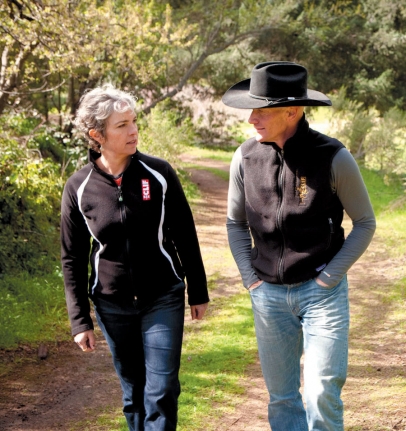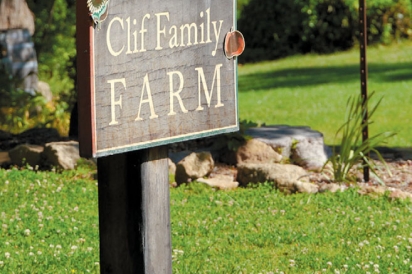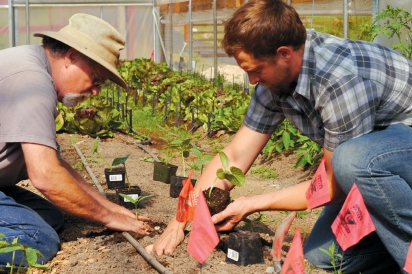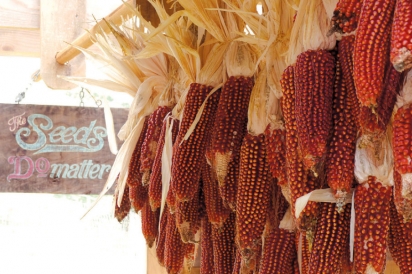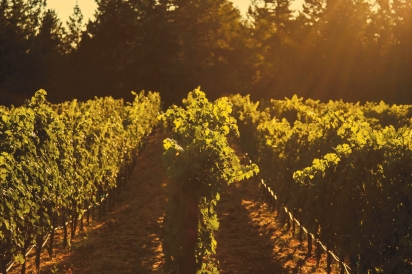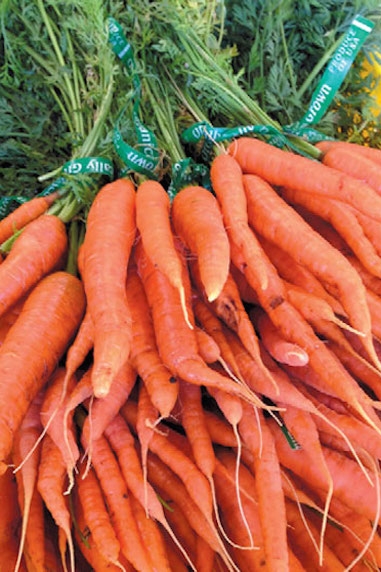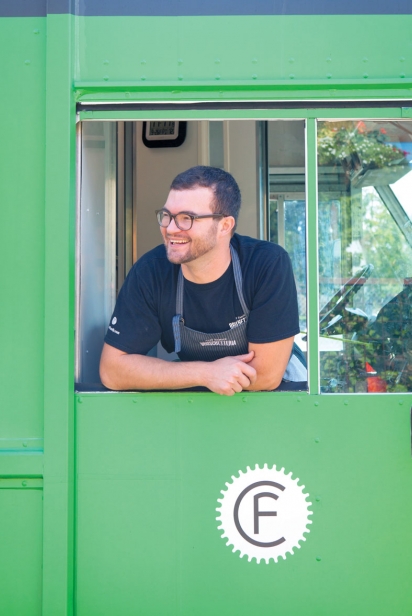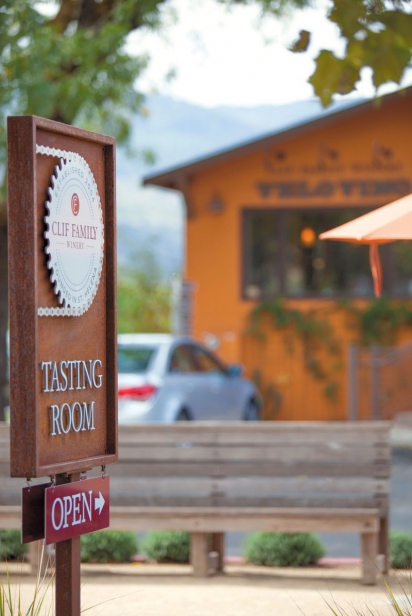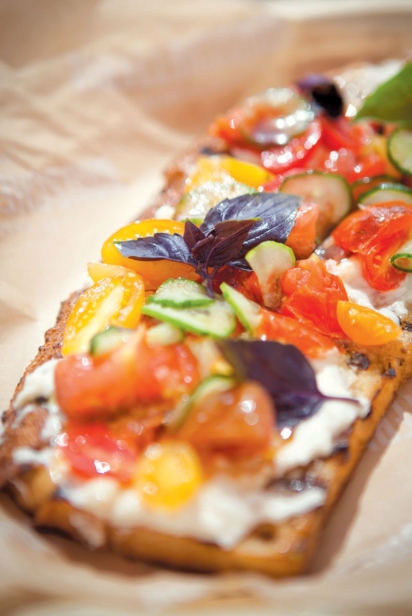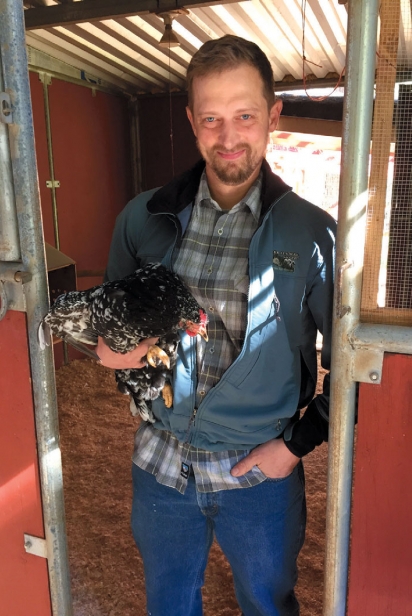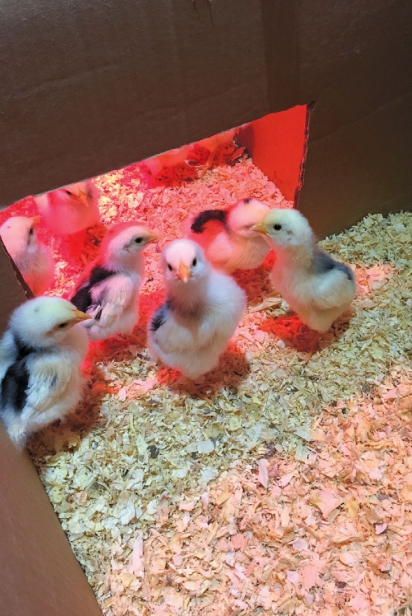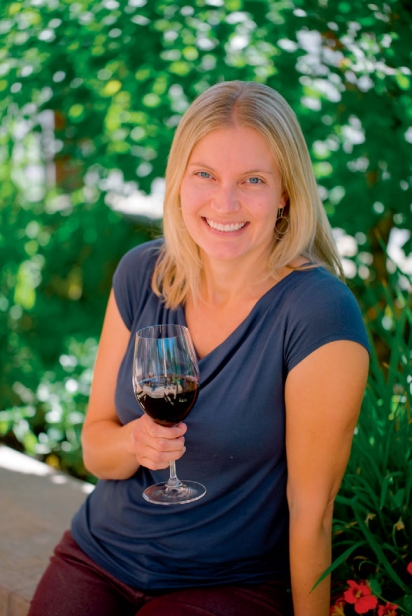Raising the Bar: Clif Family Farm and Winery
When I was young I liked to draw pictures of my “dream town.” These were colorful scenes of winding roads dotted with happy chickens, goats and sheep. Farmers with big hats and oversized smiles stood in the middle of their fields of leafy greens, bright yellow squash and towering cornstalks. Children rode bikes every which way and “downtown” on Main Street there was always a restaurant, with, you guessed it, lots of smiling customers.
In short, I drew a land where everyone worked together and had fun, making the world a happy place. Of course, this hopeful scene has been hard to find in the real world.
Recently, though, I had the pleasure of getting to know some of the extended community of individuals who work together to create the Clif Family Farm and Winery; the Bruschetteria food truck at Velo Vino, the winery’s tasting room; and the Clif Family Foundation’s Seed Matters project, and was brought back to thinking those wishful sketches might just be possible in real life.
Clif Bar founders Kit Crawford and Gary Erickson clearly have the golden touch when it comes to creating a popular product, and over the past two decades they have built a small empire in the food and wine world. The striking thing is that their endeavors are not only financially successful, but strive to improve the quality of life for everyone involved—from the farmer to the consumer to their own employees—all the while aiming for environmental sustainability. Their projects appear rooted in the idea that, as both producers and consumers, we can, and should, do better.
And they have definitely created a community. The Velo Vino tasting room on Highway 29 in St. Helena offers samples of the Clif Family organic wines, alongside jars of prepared food items like organic tomato sauce, an array of jams and jellies and olive oil made with produce grown on the Clif Family Farm in nearby Pope Valley. The bright green Bruschetteria food truck parked outside serves up Chef John McConnell’s dishes that are loaded with ingredients inspired by and sourced from the farm. The farm itself serves not only as a source for wine grapes and other food ingredients, but also as a place to bring together their family and employees to work toward a successful harvest. It is also a vanguard laboratory contributing to the effort to develop and save organic seeds that will allow farmers worldwide to increase genetic diversity and produce high yields without dangerous chemical inputs.
The drive over Howell Mountain Road from St. Helena to Pope Valley and the Clif Family Farm is a gorgeous one. The distance isn’t great— maybe 10 miles—but the destination feels worlds away. The farm is laid out across a swath of hillside overlooking a deep green expanse of the Pope Valley floodplain to the east. From here the land below looks peaceful and undisturbed, as if we’ve traveled back a century in time. This is the farm Kit and Gary purchased in 1998 as the Clif Bar business boomed, a place just outside of the buzz of the Bay Area that would lead them back to their roots, and the things they value most.
Kit grew up in Fremont. Her parents, immigrants from Canada, were enthusiastic gardeners, and she has never gone without a garden.
“My food growing started literally in my childhood backyard,” she says in an email from Bassana del Grappa, a favorite spot in Italy that inspired the Bruschetteria food truck. “At one point my parents got permission to grow food on a large plot of land behind our neighborhood homes. Every year they went crazy tilling and growing food. I learned about eating seasonal food from these childhood gardens.” The Pope Valley farm was the natural extension of that history and sensibility.
Meanwhile, not far away and also in the East Bay, young Gary was inspired by his parents, learning about gardening from his father, Clifford Erickson, a naturalist and outdoorsman who famously inspired the name of the Clif Bar, and his mother, Mary Erickson, a schoolteacher who loved to bake and cook. Like Kit, Gary inherited the “hands-on” gene from his parents, and the Pope Valley property immediately inspired both of them.
Linzi Gay, general manager of the Clif Family Farm and Winery, who has offered to be my tour guide for the day, describes Kit and Gary as “foodies before foodie was even a thing.” Linzi grew up in nearby Angwin, graduated from Cal Poly and has worked for the Crawford/Erikson family for much of the time since. She has watched first-hand the evolution and diversification of Kit and Gary’s approach to land stewardship.
“When they first moved up here they became interested in growing grapes,” she says. In wine country, monoculture is common, and 98% of the crops in the area are vineyards. They wanted to grow grapes, but they also made a commitment to creating biodiversity on their farm.”
They began to educate themselves, and reached out to others whose expertise would help them to establish the most thoughtful and sustainable farming practices possible. As it happened, two of those people were family members. Brad Crawford, Kit’s brother, farmed in Canada until he was beckoned to California to help Kit and Gary turn their land into the fertile paradise they dreamed it could be. They also called upon Gary’s nephew, Drew Erickson, who has a degree in resource management and a childhood history of learning from his grandfather (and Gary’s father) Clifford Erickson. Today Brad and Drew, with the help of gardener and horticulturalist Colby Eirman, beekeeper Rob Keller (profiled in the Spring 2015 issue of Edible Marin & Wine Country) and winemaker Laura Barrett, oversee a property that is abundant with everything from wine grapes to stone fruits to honey to heirloom vegetables and heritage breed chickens.
Linzi and I arrive at the farm early on a blue-sky afternoon, and after surveying the varied geography of the land from the high point of the driveway, we step into a nearby workroom that serves as Drew’s vinegar aging cave. Drew points to a row of wooden Hungarian vinegar barrels, naming the type of wood and its flavor results: “Mulberry and juniper add spice. Cherry adds a sweetness,” he says. The French vinegar is made with the Orleans method, a traditional “continuous” process, so the barrels perpetually hold at least 15 gallons of fermenting wine.
Next we step into the studio next door, which serves as a chick hatching room, and Drew “candles” a few of the dozens of fertile eggs that sit incubating, looking for signs of movement within, a confirmation of the egg’s viability. The farm is breeding and raising Mottled Javas, a slow-growing Cornish cross, and one of the oldest breeds in the U.S. “At one time the Mottled Java was a very common bird in the United States. It was probably the bird our great-great-grandparents would have been eating,” he tells me. At the Clif Family Farm they raise this breed primarily because they are good layers, but also because they are strong foragers—birds that readily find nutrition in the weeds and other organic matter on the farm. The flock is also regularly treated to the compost from the Clif Bar production facility in the East Bay, composed of puffed grains, dried fruit, nuts and bits of coconut. Lucky chicks.
Breeding your own chickens is not something a lot of farms choose to do, mail-ordering rotating stocks of baby chicks from other poultry operations instead. Like much else that takes place on the Clif Family Farm, this extra step ensures humane treatment and the highest quality. Raising only one breed of laying chickens also means a steady supply of consistently sized eggs—a key consideration when providing ingredients destined for Chef McConnell’s food truck.
We hop in the farm’s “mule,” the favorite motorized farm vehicle, and head down to the chicken quarters where approximately 40 hens and a few very proud roosters meander. The compound comprised of four large indoor-outdoor coops is kept so clean that an inspector from the National Poultry Improvement Program recently declared it “one of the cleanest chicken farms he had ever seen.”
Next, we visit Brad Crawford’s hoop house. On a potting table to the right of the entrance sit tomato starts that Brad planted on the first day of spring, using seeds of robust heirloom varieties that he acquired from Washington State University as part of the Clif Family Foundation’s Seed Matters program (see sidebar.) The starts are growing like gangbusters, “Almost too quickly,” he tells me, as he pinches off a tiny yellow bloom.
At our feet, healthy rows of radicchio, bitter greens, chicory, endive, radish, beets, carrots and herbs stretch out across the length of the house. This array of crops is designed for Chef McConnell’s Bruschetteria menu, a reminder of the exquisite simplicity of Italian-inspired roadside meals in the form of bruschette, spiedini and insalates. It is up to Brad to work creatively with the weather to extend growing seasons and provide a steady stream of interesting seasonal ingredients to top the truck’s extensive bruschette offerings.
“Curly kale, lots of microgreens, Dragon’s Tongue arugula, Sylvetta arugula, fennel, eggplant … and he likes just a little bit of eggplant,” reports Brad.
On the day of my visit, Brad is also planning and planting for a special “seed-to-farm-to-table” fundraising dinner for Seed Matters that will take place this coming fall, featuring unique produce grown through seed saving and selecting.
Our next stop is the hand-hewn seed-saving shed. The goals of the Seed Matters project infuse all of the farm activity, and this shed was built to save, store, select and propagate seeds. Mason jars of beans labeled with names like “Calypso” and “Lazy Housewife” line the shelves. One of the shining stars of the project is an heirloom red corn from the Italian Alps called “Floriani Red Flint.” In the Old World, this ruby-tinted corn was selected for polenta because of its distinct flavor. In its debut year on the Clif Family Farm last year, the corn did surprisingly well, and a beautiful pink polenta is now featured on the Bruschetteria menu.
The tour continues past buzzing beehives, and an equally noisy and very colorful strip of pollinator plants—California Buckwheat, various salvias and lupine, to name a few—that winds across a section of the farm. Brad calls this the “bee snake,” as it is an unconventionally shaped long and thin plot, centrally located to attract bees and encourage pollination and honey production. Next to the bee snake is a blueberry patch, all California-adapted hybrids, adorned with the first fruits of the season.
Uphill is the orchard, a medley of pear, apple, apricot, pluot and peach trees. These fruits, along with persimmons, figs and various citrus, are sold at the Clif Family Farm stand at the St. Helena Farmers’ Market on Fridays during the season, or are preserved as jams, marmalades and chutneys under the Clif Family Kitchen line. Drew and Brad stop at the peach trees to check a newfangled deep-root irrigation method they have installed in response to the California drought.
“This will use one quarter the amount of water per week. That is, if it works,” says Brad.
“With the situation we are all in, we need to try something,” adds Drew. “And then, if we are successful, we will share it.”
Amidst and around the fruit trees and vegetable plots are acres of grapes for wine and olives for olive oil. We take a moment to survey the stretch of vines that produce the Clif Family Estate Zinfandel. Last year was the first harvest of this vineyard, and the yield was a healthy 1 1/2 tons of organic Zin grapes. We climb back in the mule and rumble past a beehive set inside the trunk of a dead tree, before slowly circling the pond.
“For Kit and Gary,” Drew tells me as we finish the tour, “it’s as much about the land as it is about the product.”
On the way back down to St. Helena, Linzi describes the other two Pope Valley properties that Kit and Gary have purchased over the years, mainly for grape and olive production. The Clif Family Farm was certified organic three years ago, and all of the family’s vineyards, fields and orchards are either already certified organic or are close to certification. In total they are tending approximately 400 olive trees, mostly younger Italian and Greek varietals, but also a handful of Mission trees that are 90 years old. Like the vinegar and the preserves, the olive oils are sold under Clif Family Kitchen label, and used, of course, in the Bruschetteria food truck dishes.
“The food truck is step 60 in many steps,” says Kit Crawford. “It is an evolution of our experiences and adventures.” Indeed, the popular cheerful green mobile restaurant, with diners enjoying languid lunches under the dappled light and hanging plants of a nearby shade structure, seems to represent the culmination of the Clif Family ethos, an orientation toward quality of life.
“Kit and Gary love the social aspect of the food truck,” says Linzi. “Through all of our Clif Family work we really hope to create and share authentic experiences.”
SEED MATTERS
It has been thrilling to watch the public slowly begin to embrace an organic farm-to-table approach to food consumption over the past decades. However, as Kit Crawford and Gary Erickson came to understand as they pursued organic agriculture, a critical element is still missing in our mainstream public and political dialogue: the weighty matter of seeds.
“Seed touches our lives everyday, many times a day,” says Matthew Dillon, who served as the founding director of the Organic Seed Alliance from 2003 to 2010. “The seeds we sow affect the quality, nutrition, cost and environmental impact of our food and clothing.”
According to Matthew, in the United States, public funding for bio-engineered and conventional (nonorganic) seed research is 70 times greater than funding for organic research. And, although many modern agricultural seeds are producing high yields, they rely heavily on intensive chemical inputs and have lost their biological and genetic diversity and adaptability.
In response, Gary and Kit’s Clif Family Foundation founded Seed Matters, a non-profit organization whose mission is to promote public education and research for seed-to-farm-to-table agriculture and consumption. One of their first acts was to bring Matthew Dillon on board, giving him the title of “cultivator.”
In conjunction with university agricultural programs and other nonprofits, Seed Matters is helping farmers to breed “the heirlooms of the future,” Matthew says. These are diverse seeds that are designed by nature, and with the aid of field-based breeding techniques and selection help from farmers, can produce a higher organic yield with fewer inputs.
“We want to make organic farming better, more successful and more accessible to more people.”
This coming fall, Seed Matters plans to host a seed-to-farm-to-table dinner at the Clif Family Farm. The dinner will feature dishes prepared by prominent chefs using produce grown from selectively bred organic seed. “We want to help people understand the importance of seed in this system,” says Matthew. “And what better way to introduce the public to this idea than a meal?”
For more information on Seed Matters and the seed-to-farm-to-table dinner planned for this fall at the Clif Family Farm in Pope Valley, visit SeedMatters.org.
Photos Courtesy of Clif Family Farm


